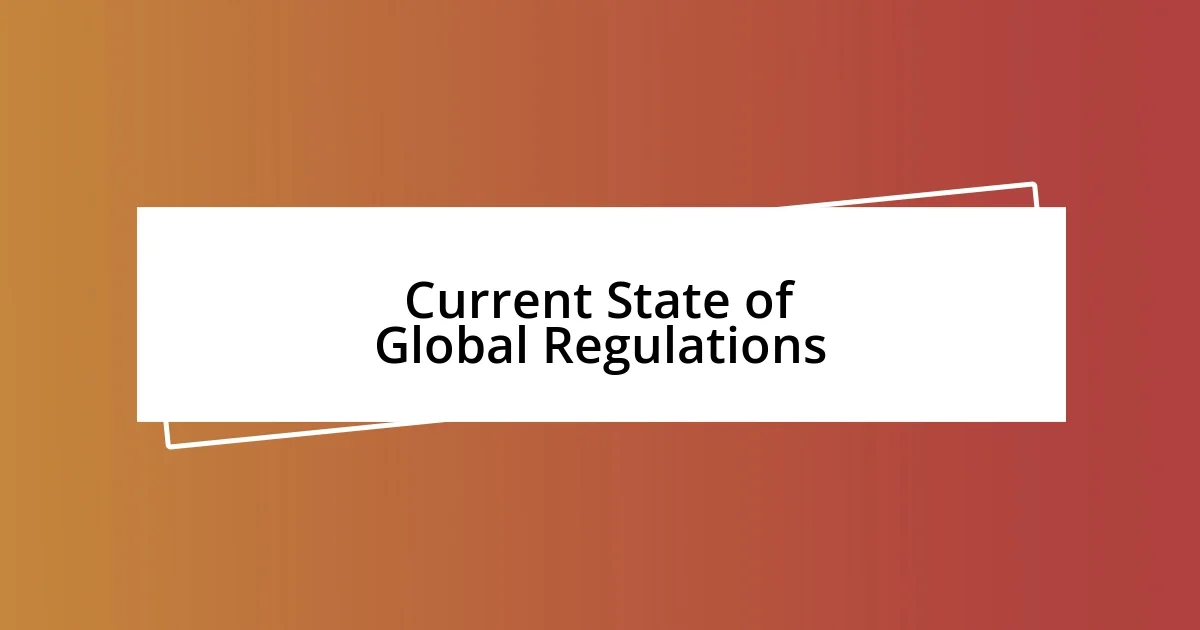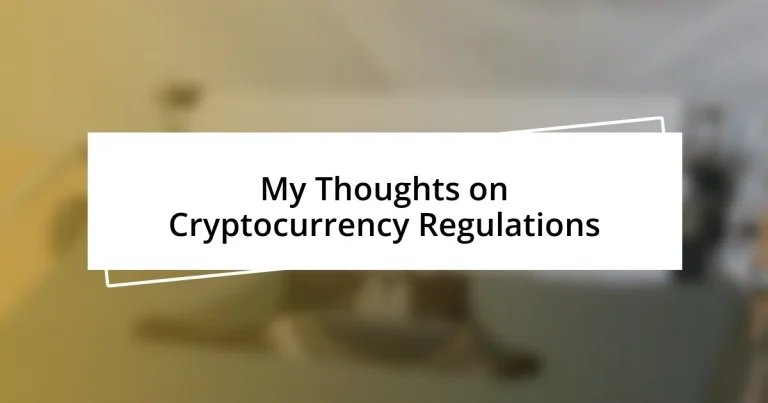Key takeaways:
- Regulatory landscapes for cryptocurrency vary significantly across countries, affecting innovation and investor sentiment, as seen in examples like El Salvador’s adoption of Bitcoin versus China’s outright ban.
- Enforcement challenges arise from decentralization, user anonymity, and rapid technological advancements, necessitating cooperation between regulators and the crypto community for effective oversight.
- The future of crypto regulation leans towards global collaboration and technology integration, highlighting the need for frameworks that protect consumers while fostering innovation.

Understanding Cryptocurrency Regulations
Diving into the world of cryptocurrency regulations can feel like navigating a maze. I remember when I first encountered these regulations, and it honestly left me overwhelmed. Why is it that something meant to promote decentralization is now caught up in so much red tape? The reality is that regulations vary from country to country, making it essential for crypto enthusiasts to stay informed about legal frameworks in their respective regions.
It’s fascinating to see how governments are scrambling to catch up with the rapid evolution of digital currencies. I often ponder whether these regulations can truly keep pace with the innovations being introduced every day. For instance, the need for consumer protection might lead to stricter laws, but could these regulations obstruct legitimate technological advancements in the crypto space? I believe achieving the right balance is crucial for the ongoing growth of this industry.
Engaging with cryptocurrency regulations has taught me the importance of being proactive. I vividly recall a moment when a new regulation impacted a project I was following closely, causing prices to plummet overnight. It was a stark reminder that as much as I enjoy the thrill of trading, understanding the legal nuances can significantly affect one’s investment strategy. How prepared are you to adapt to these changes? I’ve learned that staying updated is not just optional—it’s essential for navigating this dynamic landscape.

Current State of Global Regulations
The current state of global regulations surrounding cryptocurrency is a mixed bag, with some nations embracing innovation while others prioritize strict limitations. I recall attending a seminar where an expert discussed how countries like El Salvador adopted Bitcoin as legal tender, sparking heated debates about economic strategies and risks. On the flip side, nations like China have taken a hard stance, outright banning cryptocurrency transactions. This stark contrast highlights the ongoing tug-of-war between encouraging digital innovation and ensuring economic stability.
It’s intriguing to see how regulatory frameworks are evolving. I remember feeling a glimmer of hope when the European Union proposed its Markets in Crypto-Assets (MiCA) legislation, aiming to provide a comprehensive regulatory framework. However, as I delved deeper, I realized that the ambiguity within these regulations could still create challenges for businesses and investors. Are these regulations stepping stones towards a safer environment, or do they inadvertently stifle the very creativity they aim to protect? Personally, I think striking the right chord is vital for fostering a healthy crypto ecosystem globally.
When it comes to enforcement and clarity, the situation remains murky in many regions. I’ve seen firsthand how uncertainty can create panic among investors; during a sudden regulatory announcement in the U.S., I watched as market volatility skyrocketed. This experience reaffirmed for me that clarity in regulations is not just a benefit—it’s a necessity. Navigating through this complex web requires constant vigilance and adaptability, especially given how quickly things can change.
| Country | Regulation Status |
|---|---|
| El Salvador | Bitcoin as legal tender |
| China | Full ban on transactions |
| European Union | Proposed MiCA legislation |
| USA | Varied, state-level regulations |

Major Challenges in Enforcement
Enforcement of cryptocurrency regulations faces several significant hurdles, primarily due to the decentralized nature of digital currencies. I’ve often found myself reflecting on how difficult it must be for authorities to track transactions when every day, more blockchain innovations emerge that complicate traditional enforcement methods. Moreover, the anonymity that appeals to many crypto users makes it challenging for regulators to identify potential malpractices, creating a rich ground for either legitimate users or bad actors to operate without oversight.
Here are some of the major challenges in enforcement of cryptocurrency regulations:
- Decentralization: Traditional regulatory frameworks are built around centralized systems, making it tough to apply them to decentralized networks.
- Anonymity and Privacy: Users often engage in cryptocurrency transactions with a level of anonymity that makes oversight almost impossible without eroding privacy rights.
- Lack of Global Standards: Different countries have varying regulations, leading to confusion and gaps that can be exploited by individuals seeking to evade rules.
- Rapid Technological Advancements: The fast pace of innovation in cryptocurrencies means that regulations can quickly become outdated, making enforcement a moving target.
- Resource Limitations: Regulatory bodies may not have the technological know-how or financial resources to effectively monitor the complex world of cryptocurrencies.
Reflecting on a conversation I had with a law enforcement professional, I was struck by how daunting their task is. They described working tirelessly to understand cryptocurrency schemes that seem to change overnight. This insight made me appreciate the intricacies involved in enforcing these regulations and reinforced my belief that cooperation between regulators and the cryptocurrency community is essential for effective oversight.

Impacts on Cryptocurrency Investors
The impact of regulations on cryptocurrency investors can be quite profound, often stirring a mix of optimism and anxiety. I remember speaking with a friend who invested heavily in a promising altcoin, only to feel the wind knocked out of his sails when a regulatory update sent the coin’s value plummeting overnight. This experience taught me just how quickly changes in regulation can ripple through the market, making it imperative for investors to stay informed and agile.
One of the most significant implications for investors lies in their perceived safety. As regulations tighten, some see it as a protective barrier against fraud and market manipulation. But is that really the case? My own research has shown that while regulations can help weed out the bad actors, they may also restrict access to opportunities, especially for smaller investors who lack the resources to navigate complex compliance requirements. It’s a balancing act where the line between safety and accessibility often feels precarious.
I’ve also noticed how regulations can influence investor sentiment dramatically. During a recent conference, I overheard a panel discussing implications of new regulations in the U.S. market. The contrasting reactions were telling; some attendees expressed cautious optimism while others felt utterly defeated, fearing that the spirit of innovation would be stifled. This reality underscores a crucial question: will continued regulation lead to a more stable market, or will it drive innovation away from jurisdictions that embrace a more lenient approach? The answers to these questions remain as fluid and uncertain as the market itself.

Best Practices for Compliance
Best practices for compliance in the cryptocurrency space hinge on proactive engagement and transparency. I recall a time when a startup I consulted for prioritized building a solid compliance framework from day one. They implemented thorough Know Your Customer (KYC) procedures, ensuring that they understood the identities and backgrounds of their users. This dedication not only safeguarded them from potential legal pitfalls but also fostered trust among their community, underscoring the importance of a transparent approach.
Keeping abreast of the ever-evolving regulatory landscape is essential for businesses operating in the cryptocurrency realm. I find it invaluable to regularly review updates from regulatory bodies and engage in industry forums. Recently, I attended a roundtable discussion where experts shared insights into emerging compliance trends. It was eye-opening to hear how networking and knowledge-sharing can lead to better compliance practices, as participants exchanged experiences and strategies to navigate the complex regulations.
Ultimately, establishing a culture of compliance is vital for long-term success. I’ve seen firsthand how companies that prioritize ethical practices manage to thrive, even amid regulatory scrutiny. It raises a thought-provoking question: what would happen if all cryptocurrency businesses embraced compliance not just as a necessity, but as a pillar of their operational ethos? From my experience, making compliance a core value can truly differentiate a business in an increasingly crowded market.

Future Trends in Regulation
The future of cryptocurrency regulation seems to be leaning towards increased global collaboration. I recall a particularly engaging discussion at a recent fintech conference, where experts emphasized the necessity for cross-border dialogue. With cryptocurrencies operating beyond traditional financial borders, it makes sense that regulators are starting to realize the importance of working together. But will this approach smooth out discrepancies in regulation, or could it lead to a patchwork of rules that confuses rather than clarifies?
I’ve also observed a significant trend toward integrating technology into compliance processes. During a previous project, I worked with a blockchain-based company that utilized artificial intelligence for monitoring transactions. This not only streamlined their compliance efforts but also provided real-time insights that were invaluable for staying aligned with evolving regulations. Isn’t it fascinating how technology can both simplify and complicate the regulatory environment at the same time?
Moreover, I feel like we’re on the brink of seeing consumer protections take center stage. Just the other day, I was chatting with a fellow investor who voiced concern about the lack of support for everyday users. It struck me how vital it will be for regulators to develop frameworks that both protect investors and promote innovation. Will the regulations ultimately empower consumers, or will they suffocate the very innovations that drew them to crypto in the first place? Only time will tell.

Advocacy and Community Engagement
Advocacy and community engagement are crucial in shaping the future of cryptocurrency regulations. I remember when I participated in a local meet-up focused on cryptocurrency education. Attendees shared their stories about navigating regulatory challenges, and it was inspiring to see how passionate individuals could unite for a common cause. That experience taught me that collective voices can significantly influence policymakers, making advocacy not just beneficial but essential.
I’ve also seen the power of community initiatives firsthand. A few months ago, I volunteered for a campaign that aimed to educate underrepresented groups about their rights in the crypto space. The enthusiasm of the participants was palpable, and it made me realize how much knowledge can empower individuals in their financial journeys. Engaging with the community fosters not only awareness but also trust, which is the bedrock of any thriving cryptocurrency ecosystem.
What happens when the community rallies together to advocate for fair regulations? Based on my experience, I can confidently say that it leads to a more informed and cohesive dialogue between regulators and the public. Those moments when advocates share their stories and frustrations can create a bridge to understanding, driving home the importance of not only compliance but also the human element behind the regulations. Isn’t it time we all actively participate in this conversation?












